
Mortal Kombat Annihilation is a 1997 American martial arts fantasy film directed by John R. Leonetti in his directorial debut. Based on the Mortal Kombat video game franchise, it is the second installment in the Mortal Kombat film series and a sequel to the original 1995 film, on which Leonetti served as cinematographer. Largely adapted from the 1995 video game Mortal Kombat 3, Annihilation follows Liu Kang and his allies as they attempt to prevent the malevolent Shao Kahn from conquering Earthrealm. It stars Robin Shou as Liu Kang, Talisa Soto as Kitana, James Remar as Raiden, Sandra Hess as Sonya Blade, Lynn “Red” Williams as Jax and Brian Thompson as Shao Kahn. Only Shou and Soto reprised their roles, with the other characters from the previous film being recast.

Sub-Zero is a fictional character in the Mortal Kombat fighting game franchise by Midway Games and NetherRealm Studios. A warrior from the fictional Lin Kuei clan, he possesses ability to control ice in many forms. He is the only fighter to appear in every main installment of the series, along with the action-adventure spin-off Mortal Kombat Mythologies: Sub-Zero (1997).
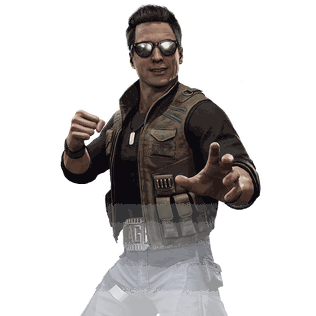
Johnny Cage is a character in the Mortal Kombat fighting game franchise by Midway Games and NetherRealm Studios. Introduced in the original 1992 game, he is an action movie star with an extensive martial arts background. The series depicts Cage as one of the primary heroes defending Earthrealm from various threats, as well as the comic foil. In the first rebooted timeline, Cage is also the love interest of Special Forces officer Sonya Blade and the father of their daughter Cassie. He is inspired by martial arts star Jean-Claude Van Damme, particularly Van Damme's character, Frank Dux, in the 1988 film Bloodsport. A staple of the franchise, Cage has appeared in various media outside of the games.
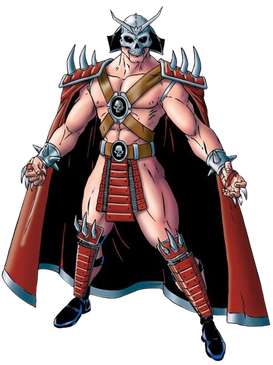
Shao Kahn is a fictional character in the Mortal Kombat fighting game franchise by Midway Games and NetherRealm Studios. Depicted as emperor of the fictional realm Outworld, he is one of the franchise's primary villains. Feared for his immense strength, which he complements with a large hammer, and knowledge of black magic, Shao Kahn seeks conquest of all the realms, including Earth. He serves as the main antagonist final boss of Mortal Kombat II (1993), Mortal Kombat 3 (1995) and its updates, and the 2011 reboot, as well as the action-adventure spin-off Mortal Kombat: Shaolin Monks (2005). An amalgam of Shao Kahn and DC Comics villain Darkseid also appears as the main antagonist and final boss of Mortal Kombat vs. DC Universe (2008) under the name Dark Kahn. A younger persona known as General Shao appears in Mortal Kombat 1 (2023).

Shang Tsung is a fictional character in the Mortal Kombat fighting game franchise by Midway Games and NetherRealm Studios. He debuted as the final boss in the original 1992 game and has remained one of the franchise's primary characters. A powerful sorcerer, he is principally defined by his abilities to shapeshift into other characters and to absorb the souls of defeated warriors. Shang Tsung is usually portrayed as the right-hand man of Outworld emperor Shao Kahn and the archenemy of Shaolin monk Liu Kang. He also appeared in Mortal Kombat: Deadly Alliance (2002), alongside Quan Chi as the eponymous Deadly Alliance, as well as in Mortal Kombat 11: Aftermath (2020) and Mortal Kombat 1 (2023).

Mileena is a character in the Mortal Kombat fighting game franchise by Midway Games and NetherRealm Studios. Introduced in Mortal Kombat II (1993), Mileena was initially depicted as a clone of the Edenian princess Kitana, created by Shang Tsung with the blood of the fictional Tarkatan species. Following the time-travelling actions of Raiden in Mortal Kombat 9 (2011), Mileena's background as a clone of Kitana remains the same. Mortal Kombat X (2015) depicts Mileena's attempts to regain the throne as the empress of Outworld, following her removal by Kotal Kahn.

This is a list of playable and boss characters from the Mortal Kombat fighting game franchise and the games in which they appear. Created by Ed Boon and John Tobias, the series depicts conflicts between various realms. Most characters fight on behalf of their realm, with the primary heroes defending Earthrealm against conquering villains from Outworld and the Netherrealm. Early installments feature the characters participating in the eponymous Mortal Kombat tournament to decide their realm's fate. In later installments, Earthrealm is often invaded by force.

Jade is a fictional character in the Mortal Kombat fighting game franchise by Midway Games and NetherRealm Studios. She debuted in Mortal Kombat II (1993) as a hidden opponent and first became playable in Ultimate Mortal Kombat 3 (1995). Her primary weapon is a steel bō staff.
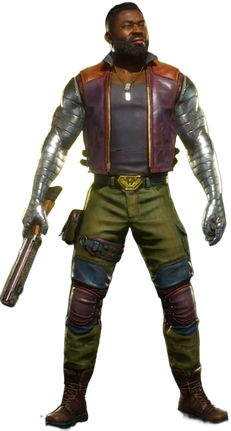
Jackson "Jax" Briggs is a fictional character in the Mortal Kombat fighting game franchise by Midway Games and NetherRealm Studios. Introduced in Mortal Kombat II (1993) as the leader of a Special Forces unit, he became a mainstay of the series, including as the protagonist of the action-adventure spin-off Mortal Kombat: Special Forces (2000). The character is distinguished by his metal bionic arms, which he first received in Mortal Kombat 3 (1995), and his abilities are based around his upper-body strength.

Kitana is a fictional character in the Mortal Kombat media franchise originally by Midway Games and later by NetherRealm Studios. Debuting in Mortal Kombat II (1993) as a player character and as a royal from the fictional realm of Edenia. She uses steel fans as her primary weapon. In the series, Kitana is aligned with multiple characters, especially Mileena who originally served as her clone, however, as the series evolves, Mileena suddenly becomes the older sister of Kitana and takes her place being the empress of Outworld. Kitana also shares the relationship as the love interest for the series' protagonist Liu Kang.
Kung Lao is a character in the Mortal Kombat fighting game franchise by Midway Games and NetherRealm Studios. He debuted in Mortal Kombat II (1993) as a Shaolin monk and close friend of series protagonist Liu Kang, and his trademark characteristic is his wide razor-brimmed hat that he uses as a weapon. Kung Lao is depicted as one of the series' primary heroes, including a main role in the action-adventure spin-off Mortal Kombat: Shaolin Monks (2005).

Kenshi Takahashi is a character in the Mortal Kombat fighting game franchise by Midway Games and NetherRealm Studios. He makes his series debut in Mortal Kombat: Deadly Alliance (2002) as a blind swordsman and Special Forces operative. In addition to his sword skills, he possesses telekinetic abilities.

Scorpion is a character in the Mortal Kombat fighting game franchise by Midway Games and NetherRealm Studios. A ninja dressed in yellow, his primary weapon is a kunai rope dart, which he uses to harpoon opponents. Since his debut in the original 1992 game, Scorpion has appeared as a playable character in every main installment except Mortal Kombat 3 (1995).

Reptile is a character in the Mortal Kombat fighting game franchise by Midway Games and NetherRealm Studios. He debuted in the original 1992 game as a hidden opponent, establishing him as the first secret character in fighting game history. Reptile became playable in the follow-up Mortal Kombat II (1993) and has remained a mainstay of the franchise. As implied by his name, he is a Saurian, a fictional species of reptilian humanoids. One of the last surviving members of his race, he aligns himself with the series' primary villains in the hope his service will lead to the Saurians' revival.
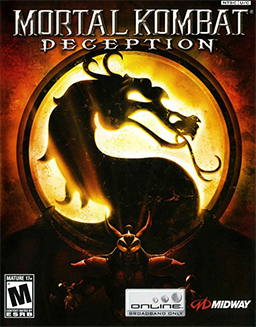
Mortal Kombat: Deception is a 2004 fighting game developed and published by Midway. It is the sixth main installment in the Mortal Kombat franchise and a sequel to 2002's Mortal Kombat: Deadly Alliance. It was released for the PlayStation 2 and Xbox in October 2004, for the GameCube in March 2005 and later ported for the PlayStation Portable under the title Mortal Kombat: Unchained in November 2006. Mortal Kombat: Deception follows the storyline from the fifth installment, Deadly Alliance. Its story centers on the revival of the Dragon King Onaga, who attempts to conquer the realms featured in the series after defeating the sorcerers Quan Chi and Shang Tsung, the main antagonists in the previous game, and the Thunder God Raiden, defender of Earthrealm. The surviving warriors from the previous titles join forces to confront Onaga.

Sonya Blade is a fictional character in the Mortal Kombat fighting game franchise by Midway Games and NetherRealm Studios. She debuted in the original 1992 game as the roster's sole female fighter, a military officer with the Special Forces. In the storyline of the games, Sonya becomes involved with the eponymous Mortal Kombat tournament through pursuit of her archenemy, the criminal leader Kano. She subsequently joins the warriors defending Earthrealm and establishes a government agency dedicated to battling otherworldly threats. The series' rebooted timeline also depicts her as the love interest to martial arts actor Johnny Cage and the mother of their daughter Cassie. A mainstay of the franchise, Sonya has also appeared in various media outside of the games. Reception to the character has been generally positive, with respect to her role as one of Mortal Kombat's primary female fighters. Though, some of her outfits in the games have received criticism.

Mortal Kombat 1 is a 2023 fighting game developed by NetherRealm Studios and published by Warner Bros. Games. It is the twelfth main installment in the Mortal Kombat series, and serves as its second reboot after 2011's Mortal Kombat. The game was released on Nintendo Switch, PlayStation 5, Windows, and Xbox Series X/S on September 19, 2023.

Liu Kang is a fictional character and the main protagonist of the Mortal Kombat fighting game franchise by Midway Games and NetherRealm Studios. Depicted as Earthrealm's greatest warrior and champion, he debuted in the original 1992 game as a Shaolin monk with special moves, which were intended to be the easiest for players to perform. Since his introduction, Liu Kang has appeared as playable in every main installment except Mortal Kombat: Deadly Alliance (2002). He is also one of the protagonists of the action-adventure spin-off Mortal Kombat: Shaolin Monks (2005).
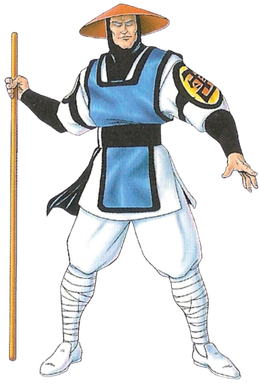
Raiden is a fictional character in the Mortal Kombat fighting game franchise by Midway Games and NetherRealm Studios. Based on the Japanese deity Raijin, he is depicted as the god of thunder who possesses control over lightning. He debuted in the original 1992 game and has appeared as a playable character in every main installment except Mortal Kombat 3 (1995) and its first update. In the storyline of the games, Raiden is the protector of Earthrealm. He fulfills his duty by selecting and training the warriors who defend Earthrealm from various threats, while also participating directly in the realm's defense. Raiden generally serves as a mentor figure to the franchise's heroes, although he sometimes assumes a darker role in the story, which sees him become more ruthless in his protection of the realm. One of the franchise's central characters, Raiden has appeared in various related media outside of the Mortal Kombat games, including guest appearances in NBA Jam Tournament Edition (1995), NFL Blitz (1997), Unreal Championship 2 (2005), and Injustice 2 (2017). He has generally received a positive reception and is among the series' most popular characters for his design and special abilities.

Mortal Kombat 11 is a 2019 fighting game developed by NetherRealm Studios and published by Warner Bros. Interactive Entertainment. It is the eleventh main installment in the Mortal Kombat series and a sequel to Mortal Kombat X (2015). The game was announced at The Game Awards 2018 and was released in North America and Europe on April 23, 2019, for Nintendo Switch, PlayStation 4, Windows, and Xbox One—with the exception of Europe's Switch version which was released on May 10, 2019. It was released on Stadia on November 19, 2019.



















